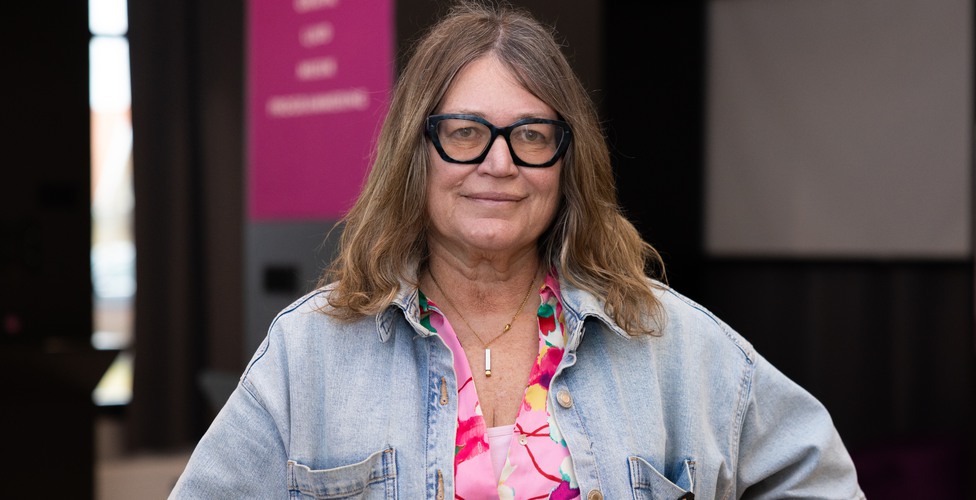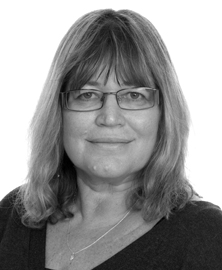Lissa Holloway Attaway’s journey began in Canada and went via the USA and Blekinge to the University of Skövde. Her passion for literature, cultural heritage and feminism has shaped a unique research path marked by the digital revolution of the 90s. Today she is an assistant professor at the University of Skövde and research group leader for GAME, where she researches and teaches interactive storytelling to give voice to the stories that are rarely heard.

Lissa Holloway Attaway, assistant professor of media, aesthetics and storytelling at the University of Skövde, grew up in Alberta, western Canada and is currently renovating a house in Varnhem, Skaraborg. The road in between is long and exciting. She attended High School in Montreal and then earned a Bachelor of Arts in Fine Arts Theatre Performance at York University in Toronto. Then her journey continued south where she earned a master's degree in traditional literature and media, and a doctorate in literature with a focus on digital media at the University of Georgia, USA. Lissa remained in Georgia for twenty years where she taught engineering in technical communication at Georgia Tech, but also in literature and other cultural subjects.
– It was the mid-nineties and the digital revolution and the rise of the internet took my career towards storytelling and digital narratives. At the same time, literary studies were a foundation in my way of teaching and I forced my engineering students to read Moby Dick, Frankenstein and other important works, Lissa says with a smile.
Across the Atlantic and on to the Baltic Sea
Her journey towards Sweden was born when Blekinge University of Technology (BTH) visited Lissa's education in Georgia. She was invited to BTH and was soon offered program responsibility for Literature, Culture, and Digital Media, and later Digital Culture and Communication. Lissa accepted and thoroughly enjoyed Karlskrona and the beautiful archipelago. In addition to teaching and program responsibility, she conducted research on digital media and culture in collaboration with both the Marine Museum in Karlskrona and other cultural partners around the Baltic Sea. Among other things, she was active in the Art Line project, which explored artistic innovation in physical and digital spaces.
Cutbacks in the cultural education at BTH prompted Lissa to look elsewhere. When the University of Skövde contacted her, Lissa was heading east rather than inland.
– I had just finished Art Line where I collaborated with researchers from the Baltics and the southern Baltic Sea region, and my focus was there rather than in Sweden. But the University and the GAME research group felt like a very good match for me. We had a wide range of researchers within the group from both film studies, game development, and literature who would now gather around games as a medium. We chose to call ourselves the GAME Research Group – Games, Art, Media, Experience, says Lissa.
Games, Art, Media, Experience
Lissa had never been to Skövde but was fascinated by the rich cultural heritage that existed in the surrounding landscape. There were historical influences everywhere in Skaraborg. Her colleague Lars Vipsjö, lecturer in Media, Aesthetics and Narrative at the University, worked on a couple of projects around cultural heritage and games. Lissa got involved and they explored gamification and new forms of digital immersion and engagement to improve user experiences at museums and cultural sites. She presented the projects KASTiS (Cultural Heritage and Game Technology in Skaraborg) and the sub-project KLUB (Kira and Luppe's Bestiarium) at several international conferences. She also participated in Seedbox: An Environmental Humanities Collaboratory, which investigated social and environmental issues, such as chemical weapons and toxins in the Baltic Sea, climate change and sustainable consumption. The four-year EU project Interactive Narrative Design for Complexity Representation (INDCOR) was recently completed, where she was deputy project manager. Here, cultural heritage was one of the focus areas along with climate change, migration and more. The project was well received and was evaluated as excellent, to Lissa's great joy and pride. In addition to research, Lissa teaches Digital Narrative: Games and Cultural Heritage - Master's Program at The University, and supervises students at master's level. This is also where her other major commitment comes in alongside cultural heritage, namely gender studies, which has been a common thread throughout Lissa's academic journey.
Gender studies a common thread
– In my doctoral thesis, I looked at Edgar Allan Poe and his work Eureka from a feminist perspective. The interest in gender remained and my research has always had some connection to the subject, even here at the University where we look a lot at equality, inclusion and power relations between genders in the gaming world. I try to get the students to understand that they too have influence and can make a difference in society. Games like Minecraft are actually about giving a voice to people who normally don't have it, says Lissa.
Towards new destinations
The research has taken Lissa towards new destinations even after she landed in Skövde. An exciting cultural project that she has been involved in was in Réunion, a former French colony east of Madagascar. The island has no indigenous inhabitants and a very large mix of cultural influences. Lissa was able to visit a game studio at the Institute of the Indian Ocean and have workshops about the students' own complicated cultural heritage, where European influence and the legacy of the slave trade are still a problem. Malta is another place that is characterized by a complicated relationship with its cultural heritage. Lissa explains that the history of a place is often told by one voice, while the reality is often more multifaceted and complicated due to colonialism, gender, and power relations. In this course, which is aimed at both researchers, students and staff in the cultural heritage sector, they look at the complexity surrounding a place or a historical object. Earlier in the INDCOR project, at the summer courses that are partly run by St. Martin’s Institute of Higher Education, Lissa has visited both the Canary Islands and Malta. This summer it is time again for a course in Malta where historical stories and cultural-historical environments underground will be given new life with the help of VR and new technology.
– Here, the course participants have the opportunity to design a prototype for an interactive experience around a historical object or around a historical environment on site in that particular environment. In addition, a good energy is created in such a small and dedicated group where a lot of work is done in a short time. I hope we get more applicants from the University who want to take the chance to tell complex stories through new technology, says Lissa.
The next adventure after Malta will take place at the University of Bremen in Bremen, Germany, where Lissa will participate in a guest researcher program during the month of October. The theme of the research is grief and games, where she will delve into the handling of death and loss from a feminist perspective within games. Lissa has previously handled the subject by supervising a student and says that it is exciting how games can tackle such challenging and difficult topics. She was chosen together with four others out of 150 applicants and is very much looking forward to that stay.
Creating critical thinkers
– We are in a situation where Swedish industry is investing in new innovations. It is important that this investment does not only take place in technical development but also in research. A large network has been formed in Skövde around game development and a lot of exciting things are happening. I am very happy to see our students' critical ideas and creative work. It is a big part of our job at the University – to create critical thinkers, and we have succeeded in that, says Lissa.

